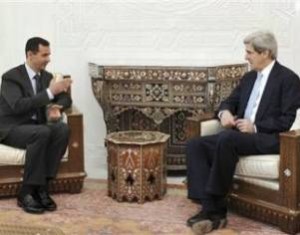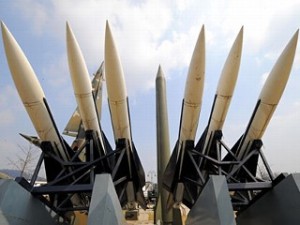 By: Hussain Abdul-Hussain
By: Hussain Abdul-Hussain
Reports that Syria has provided Lebanon’s Hezbollah with truckloads of Scud D missiles have not dissuaded America from engaging Syria.
Scuds or no Scuds, Senator John Kerry (D-MA) was fighting for the approval of Robert Ford’s nomination as ambassador to Syria, for the first time since Washington recalled Margret Scooby, after the murder of former Lebanese Prime Minister Rafik Hariri, in February 2005.
US engagement with Syria is based on the premise that luring Syria away from its alliance with Iran, Hezbollah and Hamas, is important for containing and confronting the soon-to-become nuclear Iran. To reward Damascus for breaking up with Tehran, America offers the Syrians peace with Israel, that is Syria taking back the Golan Heights that it lost to Israel in 1967.
Second, proponents of engagement argue that sending an ambassador back is good for Washington from an intelligence perspective. A US ambassador in Syria will serve as America’s eyes and ears there. Also, he would communicate, without distortion, US concerns to Syrian leaders.
Third, entertaining Syria, whether through peace with Israel or through reviving US-Syrian bilateral relations would keep Syria quite, and therefore the region stabile. Improving US-Syrian bilateral ties include sending back an ambassador and allowing US sanctions on Syria to expire.
None of the pro-engagement arguments have proven to be right so far.
The third person at the State Department, Bill Burns, met with Syrian President Bashar Assad in Damascus, on February 17, told him the US intends to send Ford, and conveyed America’s demands that Syria choose America over Iran.
Ten days later, Assad not only received Iranian President Mahmoud Ahmedinejad, he belittled America’s demands, saying he had probably misunderstood, in translation, what Burns had told him about breaking away from Tehran.
Washington interpreted Assad’s defiance in two ways. The second-in-charge at State Department, Jim Steinberg, described Assad’s comments as theatrical and insisted on engagement. On the Hill, Ford said during his hearing that engaging Syria should not be expected to yield quick results, an idea that Senator Kerry shared.
To Ford and Kerry, forget the ticking Iranian nuclear bomb or that engaging Syria was part of luring it away from Iran in the first place.
This past weekend, reports about Syria shipping truckloads of Scud D missiles to Hezbollah made the news in Washington and other world capitals. The news proved false Steinberg’s claims that Assad’s anti-American statements were only “theatrical.”
 Meanwhile, arguing that Ford can collect information inside Syria is outdated. In this time and age, information has become free for all. How a US ambassador in his motorcade in Damascus can file accurate reports is mind-boggling.
Meanwhile, arguing that Ford can collect information inside Syria is outdated. In this time and age, information has become free for all. How a US ambassador in his motorcade in Damascus can file accurate reports is mind-boggling.
As for Ford communicating American demands to Syria, Assad will always trust his ambassador in Washington, Imad Mustafa, to put whatever Ford tells him in context. Mustafa has proven to be a high caliber diplomat, shown skill in lobbying Congress people, such as Kerry, and succeeded in pushing Washington – slowly but steadily since 2005 – to re-embrace Damascus.
Finally, Steinberg, Kerry, Ford and like-minded politicians in Washington present America’s engagement with Syria as something that should be tried, as if they have just discovered Syria or the Assad regime that has been ruling it since the early 1970s.
Until February 2005, America had constantly had an ambassador in Damascus. Throughout the 1990s, Washington sent an endless number of envoys to broker Syrian-Israeli peace, but to no avail. Prior to 2005, Syria never distanced itself from Iran or stopped arming Hezbollah, Hamas or instigating violence throughout the Middle East, including in Iraq, thus causing loss of American lives.
Steinberg, Kerry, Ford and proponents of engaging Syria should start offering real answers, whenever challenged about their views on engaging Syria.
 Assad’s anti-American statements and support of Hezbollah is proving all but theatrical. When the Scud reports surfaced, Kerry should have explained how the Scuds fall into his “vision” of Syrian-Israeli peace. Instead Kerry twisted arms on his Senate Foreign Relations Committee and forced through the approval of Ford’s nomination as ambassador to Syria.
Assad’s anti-American statements and support of Hezbollah is proving all but theatrical. When the Scud reports surfaced, Kerry should have explained how the Scuds fall into his “vision” of Syrian-Israeli peace. Instead Kerry twisted arms on his Senate Foreign Relations Committee and forced through the approval of Ford’s nomination as ambassador to Syria.
Diplomacy is the best tool in foreign policy. But there is a fine line between engaging Syria, which we all seek, and Damascus taking Washington for a ride, which is actually happening under the noses of the Barack Obama administration and some Congress people who overestimate their skills in foreign affairs.
A successful vision on engaging Syria would be a roadmap that defines the mechanism of measuring what Syria delivers, within a preset timetable, and the rewards that Damascus should expect in return from the United States.
The way Steinberg, Kerry, Ford and others are conducting US engagement with Syria is identical to how the George Bush administration handled the war in Iraq in its first few years: Improvisation, lack of vision, and the loss of American lives in the process. Huffington Post

Leave a Reply
You must be logged in to post a comment.